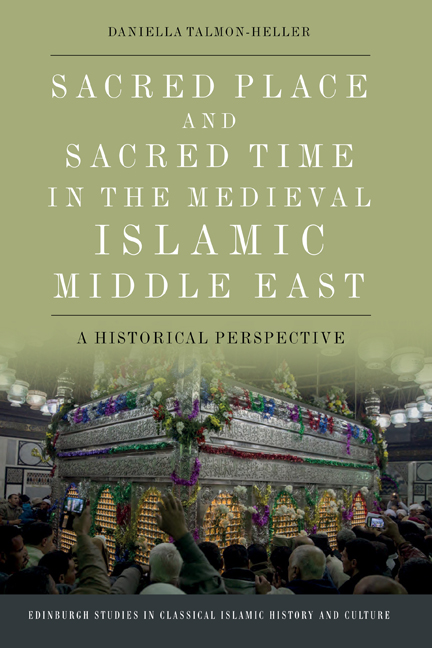Book contents
- Frontmatter
- Contents
- List of Figures
- Acknowledgements
- Map of the Middle East
- Introduction
- 1 Etic Concepts and Emic Terms
- 2 The State of the Art
- Part One A Sacred Place: The Shrine of al-Husayn’s Head
- Part Two A Sacred Time: The Month of Rajab
- Final Comments: Spacial and Temporal Sanctity
- Works Cited
- Index
5 - Excursus: Donations to Mosques and Shrines
Published online by Cambridge University Press: 17 October 2020
- Frontmatter
- Contents
- List of Figures
- Acknowledgements
- Map of the Middle East
- Introduction
- 1 Etic Concepts and Emic Terms
- 2 The State of the Art
- Part One A Sacred Place: The Shrine of al-Husayn’s Head
- Part Two A Sacred Time: The Month of Rajab
- Final Comments: Spacial and Temporal Sanctity
- Works Cited
- Index
Summary
Several decades before the donation of the twin chandeliers to the Husayni shrine in Ascalon, the Persian traveller, poet, philosopher and Ismaʿili dāʿī Nasir Khusraw wrote a detailed description of an ‘amazing’ chandelier, or polycandelon, that he saw in Fustat sometime between 439/1047 and 442/1050. He outlines a silver lamp-holder with sixteen branches, each of which is 1.5 cubits long, holding seven hundred lamps, originally ordered by the caliph al-Hakim for the old mosque of ʿAmr ibn al-ʿAs. Ibn Tuwayr and al-Qalqashandi (who reproduces some of Ibn Tuwayr's text) describe the same object as a ‘huge, beautifully structured polycandelon that contained about 1500 lamps (barraqāt; glass cups), while its base included around 100 star-shaped lanterns (qanādīl)’. This attention to detail is probably not accidental. As we will see in Part Two, lighting mosques and thoroughfares was a central ritual in Fatimid festivities, to the degree that a special term was coined for the nights of the first and fourteenth days of Rajab and Shaʿban: layālī al-wuqūd (the nights of kindling lights). Nasir Khusraw also admiringly noted silver chandeliers bearing the Fatimid ruler's name in the Dome of the Rock. In 1060, the sudden fall of one of those chandeliers, an immense tanūr which held 500 small glass lamps that hung from the dome's ceiling, was taken as a bad omen. The historian Mujir al-Din recalls that the incident frightened the residents of Jerusalem, who predicted that something terrible was about to happen in the lands of Islam. ‘And indeed’, he writes (in the fifteenth century), ‘that event was the Frankish conquest of Jerusalem’.
A Prophetic saying designates the donation of oil for the illumination of a sacred place such as Jerusalem as a proper substitution for actual prayer there. Moreover, it promises the donor that, as long as the oil he had provided for keeps burning and giving light, the angels will keep praying for him. Al-Samhudi (d. 911/1505), the celebrated historian of Medina, recalls the very first contribution to the Prophet's Mosque: Syrian-made lamps, oil and chains, donated by the companion Tamim al-Dari and his servant Abu al-Barrad.
- Type
- Chapter
- Information
- Sacred Place and Sacred Time in the Medieval Islamic Middle EastA Historical Perspective, pp. 55 - 60Publisher: Edinburgh University PressPrint publication year: 2020



